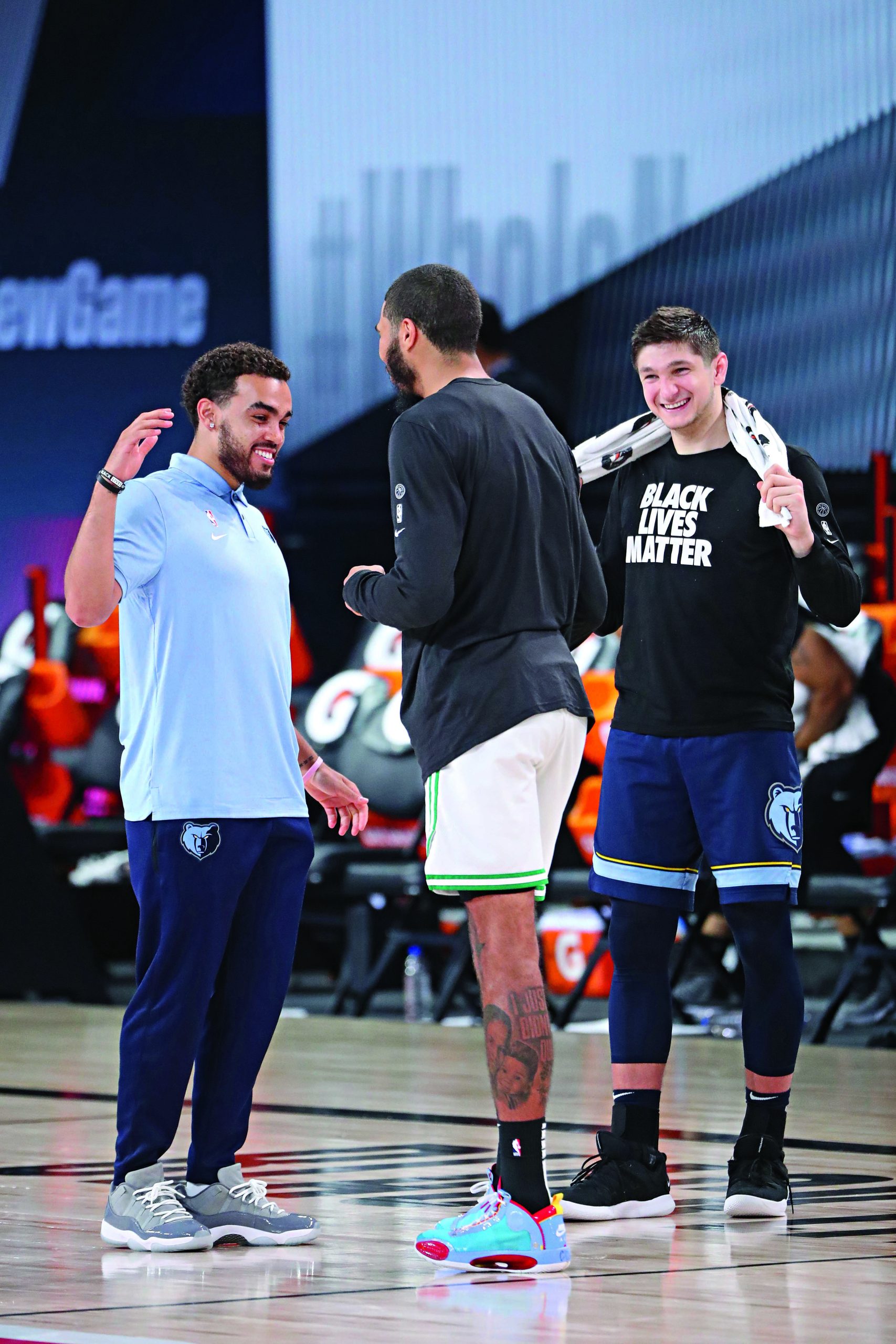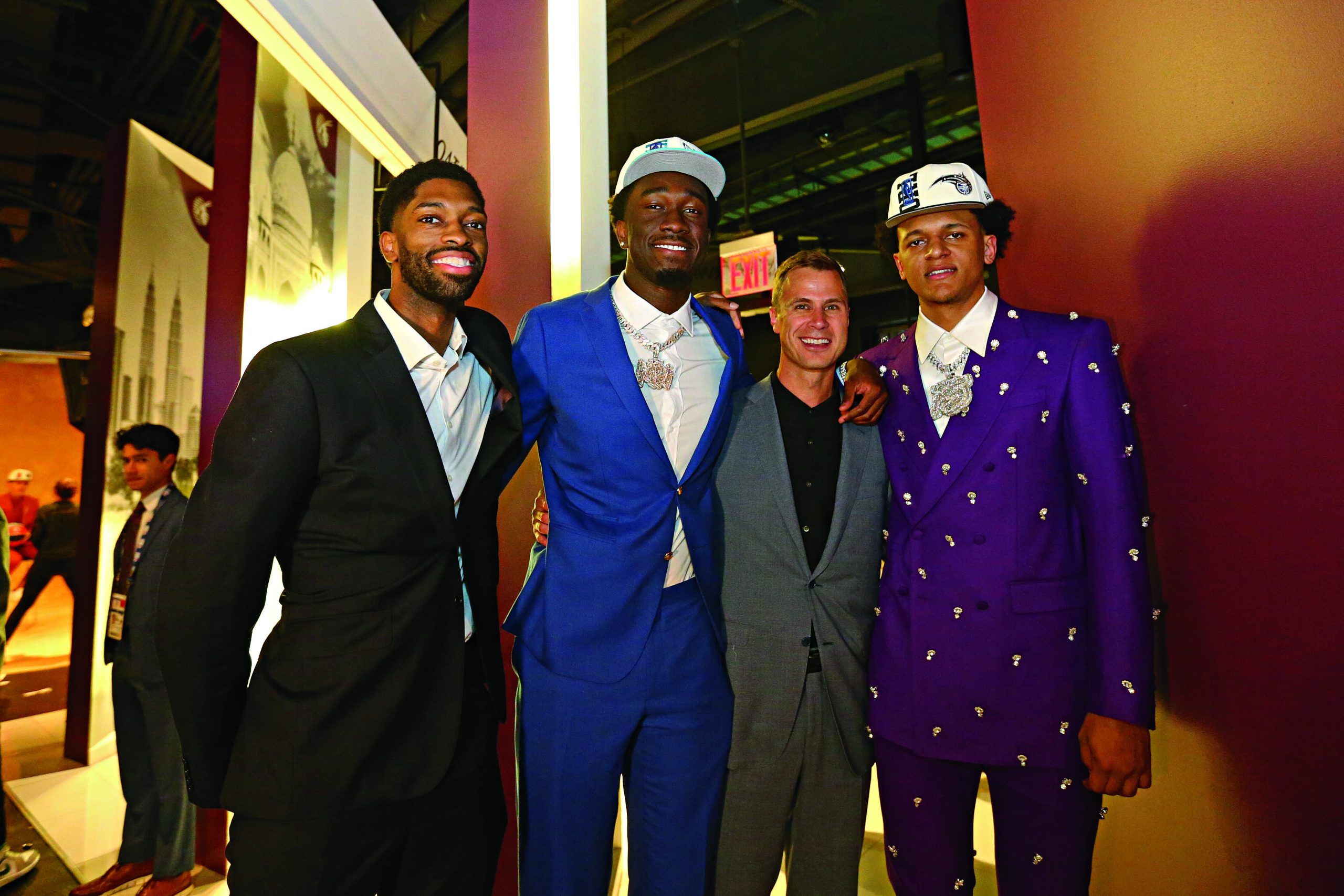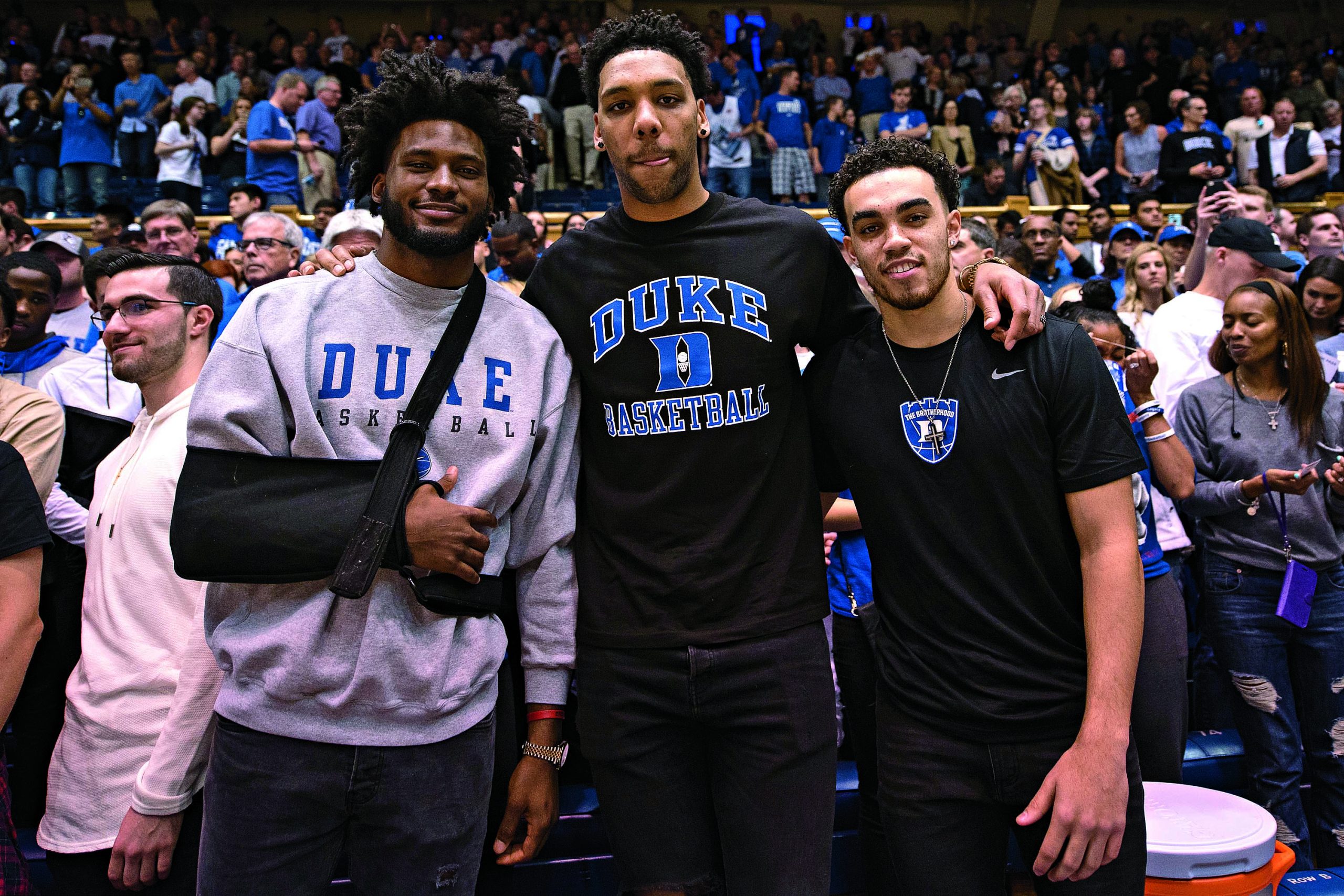Before the school year begins, freshmen on the Duke Men’s Basketball team take an unofficial summer course together. It’s called “The Brotherhood Class.”
Daily subjects vary—some lessons center on basketball, others are focused more broadly on the transition from high school to college. Professors vary as well—the recently retired Coach K spoke to the 2022 freshmen, as well as current coaches, general manager Rachel Baker and others. The overall mission of the class is clear: welcome new members to The Brotherhood. Teach them what The Brotherhood is all about.
“It’s great because you learn about the history of Duke,” says freshman center Christian Reeves.
One day, associate head coach Chris Carrawell, who played for the Blue Devils from 1996-2000, showed an hour-long video tracing Duke’s storied past. The five national titles and 15 ACC tournament championships under coach Mike Krzyzewski. The 1,129 wins since 1980 (the most ever by a coach at one school). Carrawell broke it all down, highlighting how the program has managed to find so much success.
Everyone knows about The Brotherhood. For many of Duke’s new players (both its top-ranked recruiting class and impressive group of grad transfers), it was a significant factor in their decisions to come to the university.
Still, it is tough to fully understand The Brotherhood until you are a part of it—until you are experiencing it from the inside, as opposed to just hearing about it. There are traditions in place that give newcomers an immediate feel for what they have joined: a close-knit, strong, lifelong family.
“What The Brotherhood means to me is, simply, unity and togetherness,” former Blue Devil Gary Trent Jr told SLAM in 2018. “Being part of something that’s bigger than yourself, fighting for someone other than yourself, just always looking out for the next man and your brother.”
“The Brotherhood is basically the bond that is Duke [Men’s] Basketball,” added Grayson Allen, who spent four years at Duke from 2014-18. “It’s former players from 20 years ago to guys now and to future commits. It’s the whole thing. You share a common experience of playing here, playing at Duke, playing for Coach.”

Of course, at the heart of The Brotherhood is “Coach,” who has defined the program for over four decades. “It started really because there are not a lot of cases where you get a coach who has coached so many players for so many years,” Carrawell explains. Krzyzewski is the glue that holds The Brotherhood together—the powerful connecting force at its core. He cultivates relationships between past and present Duke players. He makes sure that those bonds never fade. The Michael W. Krzyzewski Center (known on campus as the “K-Center”)—a two-story athletic and academic facility adjacent to Cameron Indoor Stadium—even has a “Legacy Locker Room,” constructed specifically to accommodate former players who come back.
Throughout his tenure, Krzyzewski established annual traditions such as K Academy, a five-day fantasy camp held at Duke in June. Campers, who must be at least 35 years old, compete in a basketball tournament and get to learn the inside scoop about the Blue Devils program. Alumni always return for the event, making it one big family reunion.
Ryan Young, a 6-10 center who recently transferred from Northwestern, was a coach at the 2022 K Academy.
“That’s where I really saw The Brotherhood,” says Young. “You have young guys like Quinn Cook, Amile Jefferson and Grayson Allen back here coaching teams, but you also have older players that I don’t even recognize that played here in the ’80s and ’90s and 2000s that have all been coming back every year for this event. It’s really cool. I’m sitting there coaching with Mark Alarie, Justin Robinson and a few other former players. And then you have, like, Shane Battier and all those guys walking around the gym like it’s nothing.”
There are typically around 30-40 former Duke players in attendance at K Academy—all bonded by their experiences at the university. Some are in the NBA (more than 20 Blue Devils are currently on NBA rosters), some are coaches, some are front office executives, some have moved on from basketball entirely.
During Krzyzewski’s illustrious career, Duke had 68 NBA Draft selections, including 42 first-round picks. Beyond just K Academy, those players constantly come back to Durham and serve as mentors for the present-day Blue Devils, many of whom aspire to follow in their footsteps.
Heading into the 2022-23 season, the team was visited by Jayson Tatum, RJ Barrett, Cam Reddish, Paolo Banchero, Mark Williams and others. Those alums didn’t just drop by to say hello—they hung around, played pick-up, worked out at the K Center, engaged with the staff, shared advice with the players. Freshman Mark Mitchell got to pick the brain of Barrett, another versatile and dynamic lefty wing who was once in his position.

“I’m trying to be where he’s at, so him just taking time out of his day to talk to me and give me tips for five minutes really meant a lot to me,” says Mitchell. “Some guys can be arrogant or act like they’re too cool, but he really sat there, talked to me, took me on the court and gave me little tips that I can [use] to be better.”
“I think the coolest part about The Brotherhood is the fact that people—us as players—own it and don’t take it for granted,” assistant coach Amile Jefferson says. Jefferson played for Duke from 2012-17, appearing in a program-record 150 games and winning a national championship in 2015.
“It doesn’t matter if you come here for nine months and you’re a one and done or you stay for four-plus years,” Jefferson continues. “When you wear this jersey and you lay your blood, sweat and tears on the line for this school, for this team, you become a part of something bigger than yourself. And guys carry that with them and it means something. So it’s cool to see guys, especially our pro guys, come back and work out with our young guys—come back and mentor them, stay in touch with them. It happens organically. It’s not like our coaches are making the alum do that, making the pro guys do that. It’s giving back, it’s paying it forward, and I think that’s what The Brotherhood is about. It’s not just a word. It’s a word that works. And it’s followed up by action.”
It isn’t a coincidence that the current coaching staff consists of three former Duke players: Scheyer, Carrawell and Jefferson (all of whom played for Coach K). That has been the program’s approach for a while now, ensuring that the traditions get passed on, the culture doesn’t fragment and The Brotherhood continues to thrive, even in Krzyzewski’s retirement. Under Scheyer, the standards will remain the same and the family will only grow.
“I think you look at the stability of our program for a long time and we plan on keeping that stability as we move forward,” Scheyer says. “[The Brotherhood] is really the feeling of what it means to play for Duke…Whether it’s one year that somebody is here or whether it’s four years, it’s not a pit stop. Duke University, Duke Basketball—it’s not a pit stop. You have to be all in.”
The Brotherhood extends far beyond the court. It’s a network of support that transcends basketball. A former Duke manager who now works in private wealth management recently came back to talk to the team about his career path.
“On the job side, if you ever need anything business-wise, you have so many people that have come through The Brotherhood,” says junior guard Jeremy Roach, captain of the 2022-23 squad. “You can ask them questions and get information from them.” Roach was drawn to Duke during his recruitment process because of the “family mentality” fostered by Coach K.
“We all try to help one another,” Carrawell stresses, whether it’s related to the game or not. “I can go to Grant Hill. Daniel Ewing can come to me. I’m pretty sure there’s a younger guy that can go to Daniel Ewing, just because we have that Duke connection.”

“Once you leave here, there’s a special connection that you feel with the guys who have played here, the guys that are about to enter our program, and the guys who are currently here,” adds Scheyer. “That’s a bond I don’t think you can explain unless you’re in it.”
Photos via Getty Images.